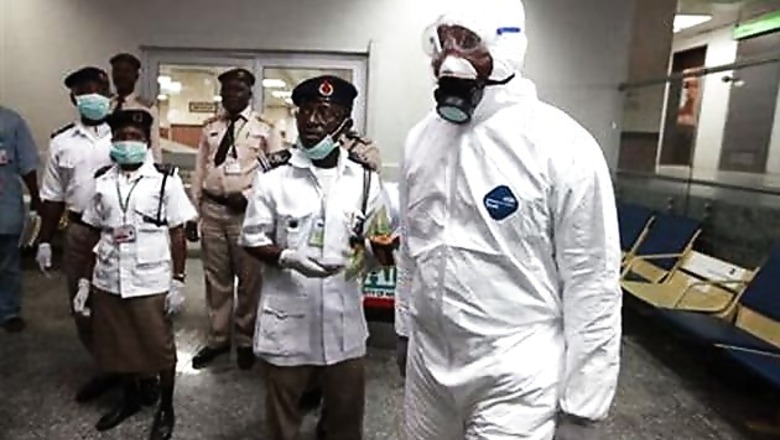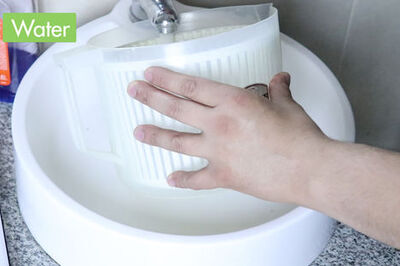
views
States of emergency were in effect across overwhelmed west African nations on Friday with the death toll from the Ebola epidemic nearing 1,000, as the World Health Organisation considered global travel restrictions to halt its spread.
Soldiers in Liberia's Grand Cape Mount province -one of the worst-affected areas - set up road blocks to limit travel to the capital Monrovia, where lawmakers gathered to ratify a 90-day state of emergency as bodies reportedly lay unburied in the city's streets.
Two towns in the east of Sierra Leone, Kailahun and Kenema, where put under quarantine on Thursday, a government spokesman said, as nightclubs and entertainment venues across the country were ordered shut.
Public sector doctors in Nigeria suspended a month-long strike with fears rising that the virus is taking hold in Africa's most populous country. The deadly tropical disease has already killed two and infected five others in Lagos.
Ebola has claimed at least 932 lives and infected more than 1,700 people since breaking out in west Africa earlier this year, according to the World Health Organisation.
The WHO, which is debating whether to declare the outbreak a "public health emergency of international concern" at an emergency closed-door session in Geneva, is expected to announce new measures on Friday, including possible global travel restrictions.
'Africans should get new drug' - As African nations struggled with the scale of the epidemic, the scientists who discovered the virus in 1976 have called for an experimental drug being used on two infected Americans to also be made available for African victims.
One of the three, Peter Piot, director of the London School of Hygiene and Tropical Medicine, said "African countries should have the same opportunity" to use ZMapp, which is made by US company Mapp Pharmaceuticals.
Ebola causes severe fever and, in the worst cases, unstoppable bleeding. It is transmitted through contact with bodily fluids, and people who live with or care for patients are most at risk.
Spain flew home a 75-year-old Roman Catholic priest, Miguel Pajares, the first European victim of the epidemic, on Thursday as Britain gave a further £3 million (3.8 million euros, $5 million) in aid to shore up Sierra Leone's beleaguered health system.
A specially equipped military Airbus A310 brought Pajares to Madrid with a Spanish nun, Juliana Bonoha Bohe, who had worked at the same hospital in the Liberian capital, Monrovia. She did not test positive for the haemorrhagic fever, the Spanish government said.
Officials said his condition was stable with no signs of bleeding, while the nun appeared to be well.
Families separated -
President Ellen Johnson Sirleaf said Liberians should expect certain rights to be suspended as the country imposes "extraordinary measures" necessary for "the very survival of our state".
People from infected zones must not be allowed to carry the virus into non-infected zones, Information Minister Lewis Brown said.
The Liberian government complained that its citizens were being harassed and stereotyped in Nigeria following the death in a Lagos hospital of one of its citizens infected with Ebola.
In Sierra Leone, which has the most confirmed infections, 800 troops were sent to guard hospitals treating Ebola patients, an army spokesman said.
The outbreak in Nigeria has been minor compared to those in Guinea, Liberia and Sierra Leone. But the seven confirmed cases in Lagos spurred the National Medical Association to call off a strike launched on July 1 over pay and conditions. The densely-packed city of more than 20 million people has a poor healthcare system and officials say that if Lagos sees a rise in infections, public hospitals will need to be operational in order to avert a catastrophe.
Benin said it had placed two patients with Ebola-like symptoms in isolation and was waiting for test results to establish if the pair were infected.
Americans 'improving' - The two infected Americans, who worked for Christian aid agencies in Liberia, have shown signs of improvement since being flown to a specialist hospital in Atlanta, Georgia. They are being given ZMapp, according to reports.
There is no proven treatment or cure for Ebola and the use of the experimental drug has sparked an ethical debate. US President Barack Obama said it was too soon to send the experimental drugs to west Africa.
"I think we have to let the science guide us. And I don't think all the information is in on whether this drug is helpful," Obama said on Wednesday.
Nigeria's Health Minister Onyebuchi Chukwu has asked the US about getting the drug, but Spain is cautious about the serum.
"We do not know of the scientific evidence, the scientific basis, the results that this serum can provide," Antonio Alemany, director general of primary health care for the Madrid region, told a news conference.
"Obviously, if the serum is effective then the Spanish government will make contact to obtain it." US regulators meanwhile loosened restrictions on another experimental drug, which may allow it to be tried on infected patients in West Africa, the company said.
The Canada-based company, Tekmira, said the US Food and Drug Administration changed the classification of its drug TKM-Ebola from full clinical hold to partial hold.
US health authorities also warned Ebola's spread to the United States was "inevitable" due to the nature of global airline travel, but that any outbreak was not likely to be large.
The worsening outbreak prompted the United States to order the families of embassy staff in Liberia to return home, with the State Department also warning US citizens not to travel to Liberia, repeating an earlier instruction from American health authorities.
First discovered in 1976 and named after a river in what is now the Democratic Republic of Congo, Ebola has killed around two-thirds of those infected, with two outbreaks registering fatality rates approaching 90 per cent. The latest outbreak has a fatality rate of around 55 per cent.















Comments
0 comment